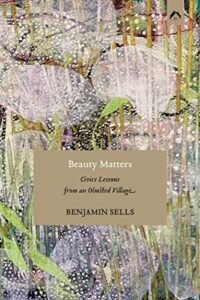
“To our modern, especially urban, minds, beauty is usually thought of as superficial, as only skin deep. It conjures connotations of narcissism and vanity. Soul is, for most of us, a religious notion, or perhaps is taken to refer to our personal subjectivity, our inner “self” that is available to each person only through introspection and reflection. As for politics, it has become a pejorative, the arena of selfish ambition and machinations, every game a zero sum. It is difficult for us to feel the essential connection between beauty, soul, and politics. One aim of this book is to redeem these old and noble words.” (From the book.)
Benjamin Sells’s premise is straight-forward—beauty is a civic necessity. Beauty inspires and sustains community and is essential to politics and governing. Beauty gives rise to love, and without love, there would be no community, no society, and no culture. It is the binding and ordering powers of beauty that draw humans together to achieve things that they could never achieve as individuals. And so, in the beating heart of every village, town, and city lies the foundational presence of beauty. This book tells the story of how as village president of Riverside, Illinois, a small suburb just west of Chicago designed by the landscape architect Frederick Law Olmsted in 1869, Sells attempted to put the idea of beauty as a civic necessity into practice. To tell this story, Sells looks at beauty in relation to politics, ethics, and nature. These ideas lie at the beginning of our Western minds and are inextricably bound together.
See our Contact page.